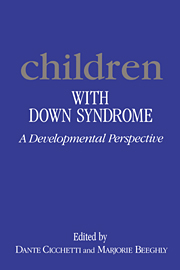Book contents
- Frontmatter
- Contents
- List of contributors
- Preface
- 1 Applying the developmental perspective to individuals with Down syndrome
- 2 An organizational approach to the study of Down syndrome: contributions to an integrative theory of development
- 3 Temperament and Down syndrome
- 4 Interactions between parents and their infants with Down syndrome
- 5 Attention, memory, and perception in infants with Down syndrome: a review and commentary
- 6 Sensorimotor development of infants with Down syndrome
- 7 The growth of self-monitoring among young children with Down syndrome
- 8 Early conceptual development of children with Down syndrome
- 9 Language abilities in children with Down syndrome: evidence for a specific syntactic delay
- 10 Beyond sensorimotor functioning: early communicative and play development of children with Down syndrome
- 11 Peer relations of children with Down syndrome
- 12 Families of children with Down syndrome: ecological contexts and characteristics
- 13 Early intervention from a developmental perspective
- Name index
- Subject index
12 - Families of children with Down syndrome: ecological contexts and characteristics
Published online by Cambridge University Press: 02 November 2009
- Frontmatter
- Contents
- List of contributors
- Preface
- 1 Applying the developmental perspective to individuals with Down syndrome
- 2 An organizational approach to the study of Down syndrome: contributions to an integrative theory of development
- 3 Temperament and Down syndrome
- 4 Interactions between parents and their infants with Down syndrome
- 5 Attention, memory, and perception in infants with Down syndrome: a review and commentary
- 6 Sensorimotor development of infants with Down syndrome
- 7 The growth of self-monitoring among young children with Down syndrome
- 8 Early conceptual development of children with Down syndrome
- 9 Language abilities in children with Down syndrome: evidence for a specific syntactic delay
- 10 Beyond sensorimotor functioning: early communicative and play development of children with Down syndrome
- 11 Peer relations of children with Down syndrome
- 12 Families of children with Down syndrome: ecological contexts and characteristics
- 13 Early intervention from a developmental perspective
- Name index
- Subject index
Summary
Children with Down syndrome constitute a group with unique developmental characteristics as well as developmental parameters more common to the general population of mentally retarded children. The preceding chapters have documented many of these developmental characteristics through representative reviews of previous research and new data-based studies. Although it is apparent that we have learned a good deal about the developmental functioning of Down syndrome children, it is likewise also apparent that little of this research has attempted to understand these developmental processes within an ecological framework. In this regard, the study of Down syndrome children mirrors that of normal child development. In fact, Bronfenbrenner (1979), in a discussion of the ecological contexts of child-rearing, made the point succinctly when he stated, “We know much more about children than about the environments in which they live or the processes through which these environments affect the course of development” (p. 844).
The family provides the primary developmental context influencing the psychological growth, development, and well-being of children. This notion is pervasive in the literature from the earliest theoretical formulations of psychodynamic models to the overwhelming number of empirical investigations of the influence of parental attitudes, perceptions, and behavior on child development as well as the more reciprocal notions involving the child's influence on the parent. Yet these studies deal with the family context only in the narrowest sense. We have generally not studied the family as an integrated interactive system nor have we made concerted efforts to understand the various ecological contexts that affect families and thereby directly and indirectly influence child development.
- Type
- Chapter
- Information
- Children with Down SyndromeA Developmental Perspective, pp. 399 - 423Publisher: Cambridge University PressPrint publication year: 1990
- 9
- Cited by

